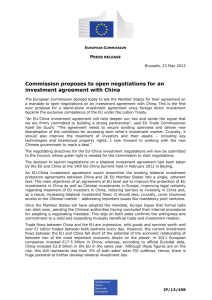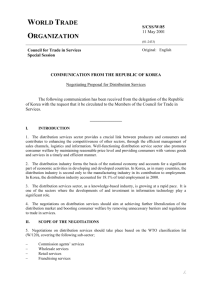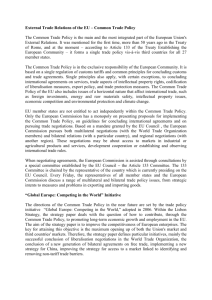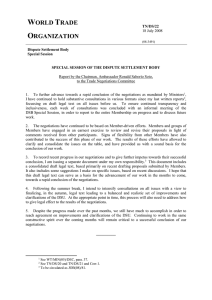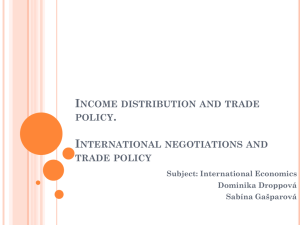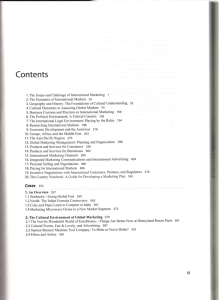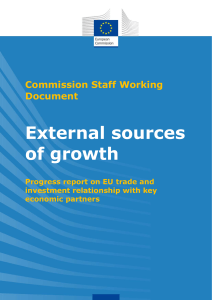Trade in Financial Services in LAC: Safeguarding Stability
advertisement
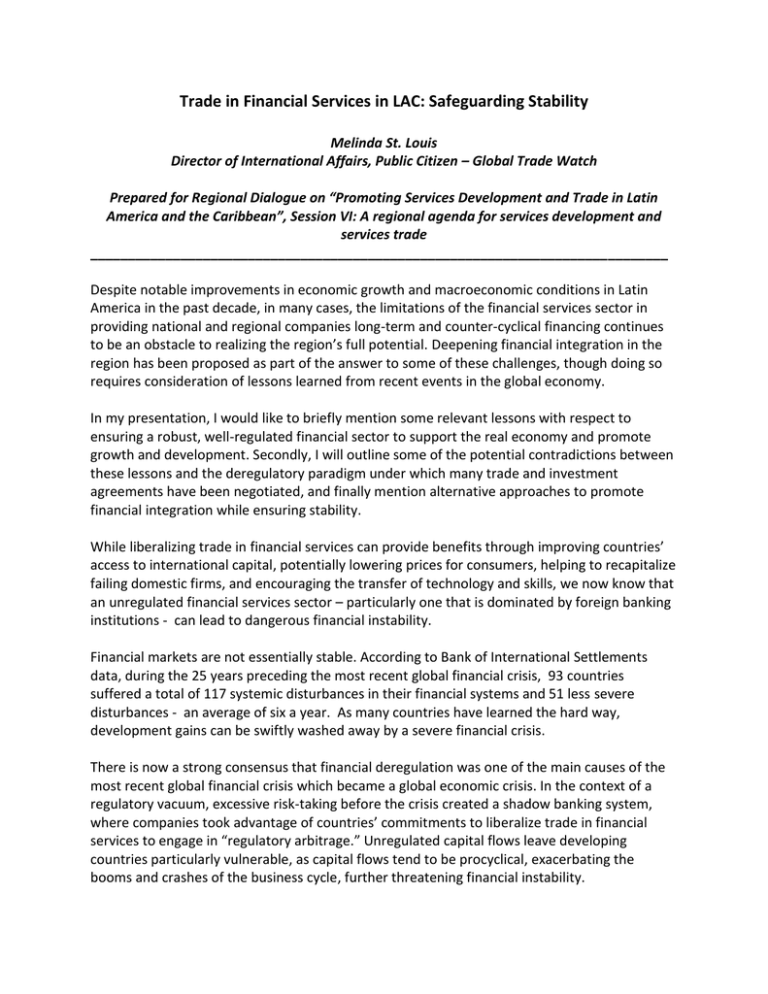
Trade in Financial Services in LAC: Safeguarding Stability Melinda St. Louis Director of International Affairs, Public Citizen – Global Trade Watch Prepared for Regional Dialogue on “Promoting Services Development and Trade in Latin America and the Caribbean”, Session VI: A regional agenda for services development and services trade _____________________________________________________________________________ Despite notable improvements in economic growth and macroeconomic conditions in Latin America in the past decade, in many cases, the limitations of the financial services sector in providing national and regional companies long-term and counter-cyclical financing continues to be an obstacle to realizing the region’s full potential. Deepening financial integration in the region has been proposed as part of the answer to some of these challenges, though doing so requires consideration of lessons learned from recent events in the global economy. In my presentation, I would like to briefly mention some relevant lessons with respect to ensuring a robust, well-regulated financial sector to support the real economy and promote growth and development. Secondly, I will outline some of the potential contradictions between these lessons and the deregulatory paradigm under which many trade and investment agreements have been negotiated, and finally mention alternative approaches to promote financial integration while ensuring stability. While liberalizing trade in financial services can provide benefits through improving countries’ access to international capital, potentially lowering prices for consumers, helping to recapitalize failing domestic firms, and encouraging the transfer of technology and skills, we now know that an unregulated financial services sector – particularly one that is dominated by foreign banking institutions - can lead to dangerous financial instability. Financial markets are not essentially stable. According to Bank of International Settlements data, during the 25 years preceding the most recent global financial crisis, 93 countries suffered a total of 117 systemic disturbances in their financial systems and 51 less severe disturbances - an average of six a year. As many countries have learned the hard way, development gains can be swiftly washed away by a severe financial crisis. There is now a strong consensus that financial deregulation was one of the main causes of the most recent global financial crisis which became a global economic crisis. In the context of a regulatory vacuum, excessive risk-taking before the crisis created a shadow banking system, where companies took advantage of countries’ commitments to liberalize trade in financial services to engage in “regulatory arbitrage.” Unregulated capital flows leave developing countries particularly vulnerable, as capital flows tend to be procyclical, exacerbating the booms and crashes of the business cycle, further threatening financial instability. Thus, since the crisis, there has emerged a common acceptance among mainstream economists that financial markets need rules, limits and surveillance in order to make market failures less frequent and costly and that capital flow liberalization may be unwise before a country's financial institutions have become strong and stable. Hence, it is critically important for governments to utilize all appropriate measures in their policy toolbox to strengthen their regulatory framework to ensure financial stability. Efforts have begun to reregulate the financial sector in the U.S. and Europe, where the crisis originated, as well as various global and regional processes, including in Latin America. In this context, an issue that has perhaps not received sufficient attention is the disconnect between efforts toward financial reregulation and the deregulatory rules present in many global, regional, and bi-lateral trade and investment treaties, which may restrict governments’ ability to effectively deploy such regulations. In the early 1990s when many of the these trade rules on services were negotiated in the context of the Uruguay Round of the World Trade Organization’s General Agreement on Trade in Services, financial deregulation was in vogue. Many bilateral and regional free trade agreements and investment treaties have replicated this model as well. I’d like to mention three areas where these trade and investment pact rules can be problematic vis-à-vis financial regulatory efforts. First - Under the market access rules in services that have been replicated in many bilateral and regional trade agreements, when a country commits to liberalization of a certain sector, such as the financial sector, the country agrees to not engage in certain types of regulation – even regulation that disciplines domestic and foreign service providers alike. One such market access rule has been interpreted by the World Trade Organization as a prohibition on any bans on financial services or products. That means no bans on the toxic derivatives that contributed to the financial crisis. That same rule prohibits any limits placed on the size of a bank or other financial service provider, which can contradict efforts to prevent banks from becoming too big to fail. Another market access rule conflicts with the usage of firewalls to make sure that the banks that hold government-insured deposits are not allowed to also engage in risky, hedge-fund-style bets. While the rules do include an exception for prudential measures, the language of the exception is widely considered to be ambiguous if not self-cancelling. Secondly – trade and investment rules ban restrictions on capital transfers in liberalized service sectors. While requiring free flow of capital in the context of trade in other types of services may be defensible, financial services are unique in that the large, potentially destabilizing capital flows constitute the service itself. Many countries, including Chile and Brazil and others in the region, have made good use of capital controls to avoid economically distorting “hot money”, asset bubbles, and economically dislocating large inflows that threaten financial stability. Similarly, countries such as Malaysia that instituted capital controls weathered the Asian financial crisis better than countries that did not. These lessons have led to a shift in the global thinking on capital controls - evidenced by the International Monetary Fund’s new institutional view late last year which endorses capital controls as a legitimate policy tool to prevent destabilizing inflows and outflows of speculative money. Unfortunately the position of at least the United States’ trade negotiators has not been updated – we understand that they continue to demand a ban on capital controls without even modest exceptions in the context of the Trans-Pacific Partnership negotiations. A paper published last month by Boston University reviews Chile’s successful use of capital controls yet notes that in the context of the TPP negotiations, Chile’s policy space to implement such measures would be significantly reduced if it agrees to the model included in the model U.S. bilateral investment treaties. While securing exceptions that require the IMF to certify a balance of payments crisis or that exempt specific capital controls measures that a country has in force at the time of negotiations provides some safeguard for governments, such exceptions would need to be expanded to protect governments’ policy space to utilize capital controls on inflows as a prophylactic measure to avoid crises in the first place or to respond to future challenges. A third element of trade and investment treaty obligations that can contravene governments’ ability to effectively regulate the financial sector is the inclusion of investor to state dispute settlement in free trade agreements and bilateral investment treaties, which empowers foreign banks to sue sovereign governments in three-person tribunals outside of domestic courts to rule on the validity of financial regulations or capital controls. They could do so by claiming expansive rights, such as one that some tribunals have interpreted as a foreign corporation or bank’s right to have a regulatory framework that meets its expectations. This is not a hypothetical threat. There has been an explosion of investor-state cases in the last ten years, requiring at least $6.5 billion in taxpayer dollars to be paid to corporations in compensation. Under the investor-state system of existing deals, foreign firms have challenged too-big-to-fail regulations in the Czech Republic and won. Foreign corporations have challenged emergency stability financial measures in Argentina and won. And cases are still pending against various countries’ policies to restructure sovereign debt, including Greece. These contradictions between efforts to safeguard financial stability and trade and investment obligations have been highlighted by trade and finance experts in the years since the crisis – the United Nations so-called Stiglitz Commission in 2009 noted: “The framework for financial market liberalization under the Financial Services Agreement of the General Agreement on Trade in Services (GATS) under the WTO and, even more, similar provisions in bilateral trade agreements may restrict the ability of governments to change the regulatory structure in ways which support financial stability, economic growth, and the welfare of vulnerable consumers and investors.” 2011 UNCTAD’s Trade and Development Report further noted: “The General Agreement on Trade in Services (GATS) of the World Trade Organization (WTO), many bilateral trade agreements and bilateral investment treaties (BITs) include provisions relating to payments, transfers and financial services that may severely limit not only the application of capital controls, but also other measures aimed at re-regulating or restructuring financial systems.” These concerns remain quite relevant in the context of on-going trade and investment negotiations in which some countries in the region are actively participating. With the Doha round of WTO negotiations stalled, plurilateral negotiations of a Trade in Services Agreement (TISA) – including Chile, Peru, Panama, Mexico, Colombia – began this year, with an intent to deepen financial services liberalization commitments and potentially seek new disciplines on domestic regulation. It would seem prudent for governments participating to consider the implications of deepening such commitments without updating and clarifying these rules that were originally negotiated in the heyday of deregulation of the 1990s and to reject any further attempts to require a “standstill” on financial regulation. The Trans-Pacific Partnership (TPP) negotiations present another opportunity for parties to ensure that policy space is not further diminished for needed prudential and macroprudential regulatory measures. Let me conclude by mentioning that some countries are beginning to actively engage these concerns. Earlier this year, after several years of resistance from the U.S. and EU, Ecuador successfully petitioned WTO members to hold dedicated discussion in its financial services committee about macroprudential financial regulation in the wake of the crisis. In the context of current negotiations of the TPP, we understand that the U.S. position of an absolute ban on capital controls with no exceptions and wide coverage of investor-state dispute settlement is being challenged by some negotiating parties, who are pushing for at least modest exceptions for capital controls and to exempt financial services from investor-state dispute settlement, and Australia has maintained a position that it will not be bound by investor-state settlement at all. At the same time that discussions are underway regionally for alternative approaches to financial integration that promotes financial stability, including efforts by several Latin American countries to consider alternatives to current form of investor-state arbitration to hopefully to strike a better balance between the rights of investors and the state’s right to regulate. Ultimately, these steps may lead to a broader review to clarify and renegotiate some of these trade and investment rules. Such reflection and proposals for alternative approaches are important steps toward ensuring that countries in the region can capture the benefit of trade in financial services for their growth and development goals while ensuring a robust regulatory framework to safeguard financial stability.
